|
Sergeant Alfred
Richards VC
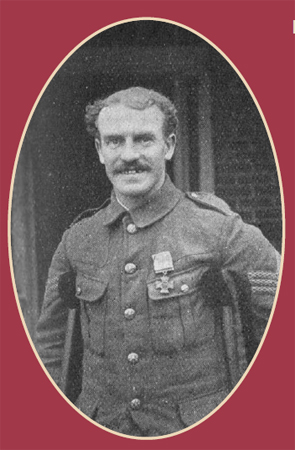
The Gallipoli 'Lancashire Landing'
Victoria Cross Group of Seven to Sergeant A. Richards, 1 Battalion Lancashire
Fusiliers,
one of the famous 'Six Before Breakfast'
(a) Victoria Cross, reverse of suspension bar engraved 'Sergt A. Richards,
1st Bn Lancashire Fusrs', reverse of Cross engraved
'25 April 1916', the arms of the cross additionally engraved 'Sergt
A Richards 1 Battn Lancs Fusrs'
(b) 1914-15 Star (1293 Sjt. A. Richards. Lan. Fus.)
(c) British War and Victory Medals (1293 Sjt.A. Richards. Lan. Fus.)
(d) 1939-45 Defence Medal
(e) Coronation 1937
(f) Army Long Service & G.C., G.V.R. (1293 Sjt: A.Richards. V.C.
Lanc: Fus, the group good very fine
(g) A Silver Cigarette case (Hallmarks for Birmingham 1914), the outside
cover engraved
'Presented as a Token of Esteemed Regard to Sergt. Alfred Richards V.C.
1st Batn Lancs Fus
from the Sergts 7th (R) Batn Lancs. Fus. 3rd June. 1916.'
(h) Box for 1939-45 Defence Medal addressed to Mr A Richards, Southfields,
Wandsworth
(i) A quantity of original documents, including Certificate of Discharge
1906 and Character on Discharge 1907,
Certificate of Discharge from Second Enlistment 1915, 'Small Book' ,
various Certificates of Attainment, etc. (7)
Estimate ? 130,000-150,000
Sergeant Alfred Joseph Richards
V.C. born 25.8.1880 in Plymouth, Devon, the son of Charles N. Richards,
late Colour Sergeant, 2nd Battalion, 20th Lancashire Fusiliers; educated
at St Dominic's Priory School, Newcastle-upon-Tyne;
giving his trade as 'musician', he enlisted in the Lancashire Fusiliers
as a bandboy at Newcastle 4.7.1895,
and served in Ireland with the 1st Battalion, where he was appointed
full drummer; served in Crete, 1899,
and promoted to Lance Corporal; served in Malta, Gibraltar and Egypt,
returning to England in 1907;
after two months in civilian life Richards re-enlisted, and rejoined
his old Battalion in India; in 1915
the Battalion embarked for the Dardanelles, destined to take part in
the greatest amphibious
operation carried out during the course of the Great War. As the spearhead
of 86 Fusilier Brigade,
the Lancashire Fusiliers were to seize a small sandy cove lying between
Cape Helles and Tekke Burnu.
The cove, named 'W Beach', was well defended, the Official History stating
'So strong were the defences
that even though the garrison was but one company (3rd/26th Regt.) of
infantry, the Turks may well have
considered them impregnable to an attack from open boats'. The attack
was timed for 6.00 a.m. on 25 April 1915.
Any element of surprise was sacrificed in favour of a naval bombardment
of the enemy positions.
The landing was to become famous as 'The Lancashire Landing.'
V.C. London Gazette 24.08.1915
'Richard Raymond Willis, Capt.; Alfred Richards, No. 1293, Sergt.,
William Keneally, No. 1809, Private, 1st Battn. The Lancashire Fusiliers.
Date of Acts of Bravery: 25 April 1915.
On the 25th of April 1915, three Companies and the Headquarters of the
1st Battn. Lancashire Fusiliers,
in effecting a landing on the Gallipoli Peninsula to the west of Cape
Helles, were met by very deadly fire
from hidden machine guns which caused a great number of casualties.
The survivors, however, rushed up
to and cut the wire entanglements, notwithstanding the terrific fire
from the enemy, and
after overcoming supreme difficulties, the cliffs were gained and the
position maintained.
Amongst the very gallant officers and men engaged in this most hazardous
undertaking,
Capt. Willis, Sergt. Richards and Private Keneally have been selected
by their comrades
as having performed the most signal acts of bravery and devotion to
duty.'
Captain Clayton, who was killed
six weeks later, wrote: "There was tremendously strong barbed wire
where
my boat was landed. Men were being hit in the boats and as they splashed
ashore. I got up to my waist in water,
tripped over a rock and went under, got up and made for the shore and
lay down by the barbed wire.
There was a man there before me shouting for wire-cutters. I got mine
out, but could not make the slightest impression.
The front of the wire by now was a thick mass of men, the majority of
whom never moved again?.
The noise was ghastly and the sights horrible. I eventually crawled
through the wire with great difficulty,
as my pack kept catching on the wire, and got under a small mound which
actually gave us protection.
The weight of our packs tired us, so that we could only gasp for breath.
After a little time we fixed bayonets
and started up the cliffs right and left. On the right several were
blown up by a mine (It was in fact a British naval shell.)
When we started up the cliff the enemy went, but when we got to the
top they were ready and poured shots on us."
Major Shaw, who also did not
survive the campaign, wrote: "About 100 yards from the beach the
enemy opened fire,
and bullets came thick all around, splashing up the water. I didn't
see anyone actually hit in the boats, though several were;
e.g. my Quartermaster-Sergeant and Sergeant-Major sitting next to me;
but we were so jammed together that you
couldn't have moved, so that they must have been sitting there, dead.
As soon as I felt the boat touch,
I dashed over the side into three feet of water and rushed for the barbed
wire entanglements on the beach;
it must have been only three feet high or so, because I got over it
amidst a perfect storm of lead and made for cover,
sand dunes on the other side, and got good cover. I then found Maunsell
and only two men had followed me.
On the right of me on the cliff was a line of Turks in a trench taking
pot shots at us, ditto on the left. I looked back.
There was one soldier between me and the wire, and a whole line in a
row on the edge of the sands.
The sea behind was absolutely crimson, and you could hear the groans
through the rattle of musketry.
A few were firing. I signaled to them to advance. I shouted to the soldier
behind me to signal, but he shouted back
'I am shot through the chest'. I then perceived they were all hit."
Captain Willis, who led C Company
into the attack, later recalled 'Not a sign of life was to be seen on
the
Peninsula in front of us. It might have been a deserted land we were
nearing in our little boats.
Then crack! The stroke oar of my boat fell forward, to the angry astonishment
of his mates.
The signal for the massacre had been given; rapid fire, machine guns
and deadly accurate sniping opened from the cliffs above,
and soon the casualties included the rest of the crew and many men.
The timing of the ambush was
perfect; we were completely exposed and helpless in our slow moving
boats,
just target practice for the concealed Turks, and within a few minutes
only half of the thirty men in my boat were left alive.
We were now 100 yards from the shore, and I gave the order 'Overboard'.
We scrambled out into some four feet of water
and some of the boats with their cargo of dead and wounded floated away
on the currents still under fire from the snipers.
With this unpromising start the advance began. Many were hit in the
sea, and no response was possible,
for the enemy was in trenches well above our heads.
We toiled through the water
towards the sandy beach, but here another trap was awaiting us, for
the Turks had cunningly
concealed a trip wire just below the surface of the water and on the
beach itself were a number of land mines,
and a deep belt of rusty wire extended across the landing place. Machine-guns,
hidden in caves at the
end of the amphitheatre of cliffs enfiladed this.
Our wretched men were ordered
to wait behind this wire for the wire-cutters to cut a pathway through.
They were shot in helpless batches while they waited, and could not
even use their rifles in retaliation since the sand
and the sea had clogged their action. One Turkish sniper in particular
took a heavy toll at very close range
until I forced open the bolt of a rifle with the heel of my boot and
closed his career with the first shot,
but the heap of empty cartridges round him testified to the damage he
had done.
Safety lay in movement, and
isolated parties scrambled through the wire to cover. Among them was
Sergeant Richards with a leg horribly twisted, but he managed somehow
to get through.'
The Lancashire
Fusiliers had started the day with 27 Officers and 1,002 other ranks.
The next morning they numbered 16 Officers and 304 men.
Richards was evacuated first
to Egypt, where surgeons amputated his right leg above the knee, then
home to England.
He was discharged 31.7.1915, after 26 years with the colours. His discharge
papers read 'no longer fit for war service
(but fit for civil employment)'.
At the time of the award of
his Victoria Cross Richards was living alone at the Princess Christian
Soldiers' and Sailors' Home
in Woking. He had no family in England, and the newspapers referred
to him as 'The Lonely V.C.'
In September 1916 he married Miss Dora Coombes, who had nursed him during
his period of convalescence in Woking.
Despite his disability he remained an active member of the Regimental
Old Comrades Association and even joined the
Home Guard during the Second World War, serving as Provost Sergeant,
28 County of London Battalion.
He died at the age of 73 in Southfields, London, in 1953, and is buried
in Putney Vale Cemetery.
Joe
Omnia Audax XXth
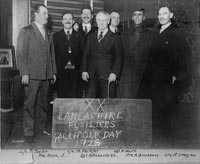
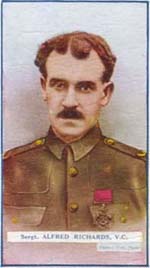
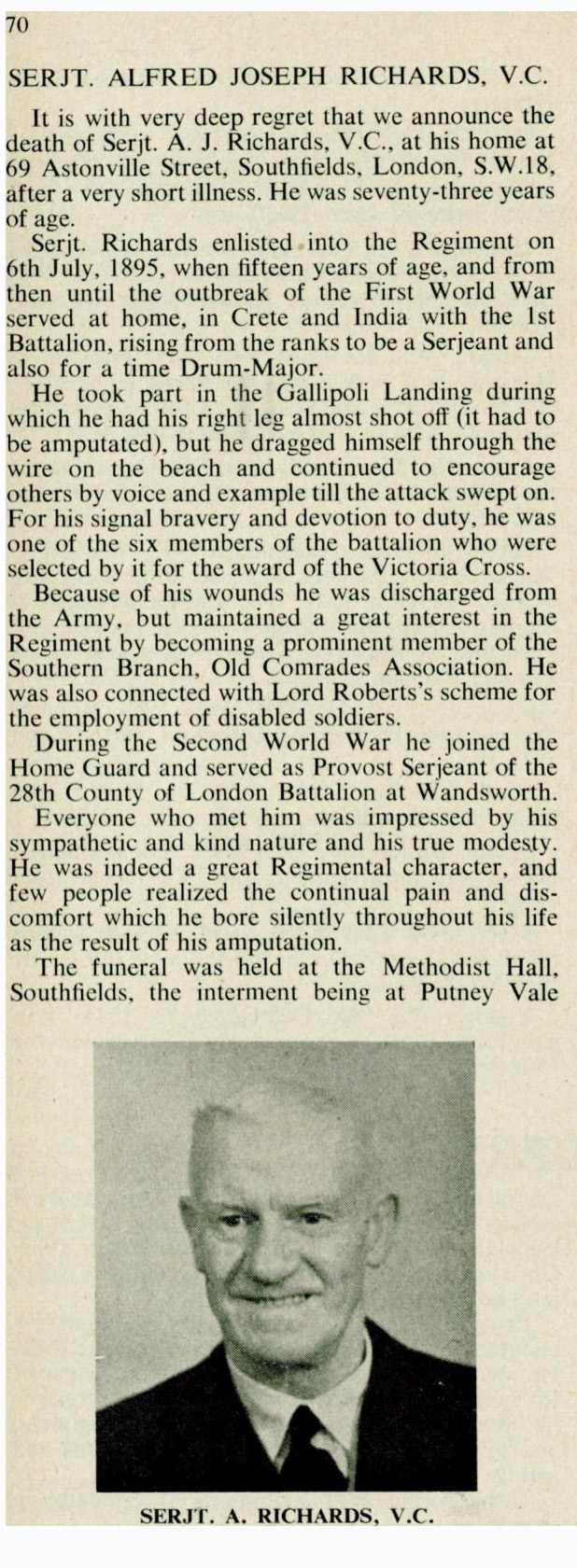
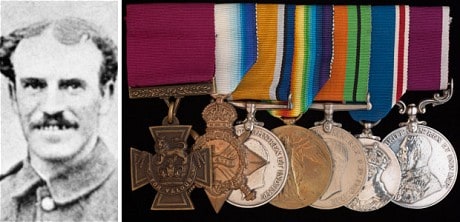

|






